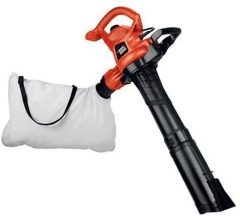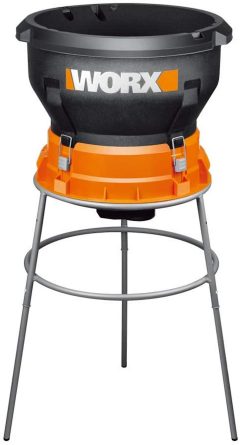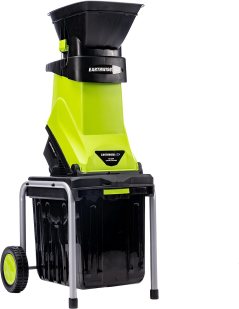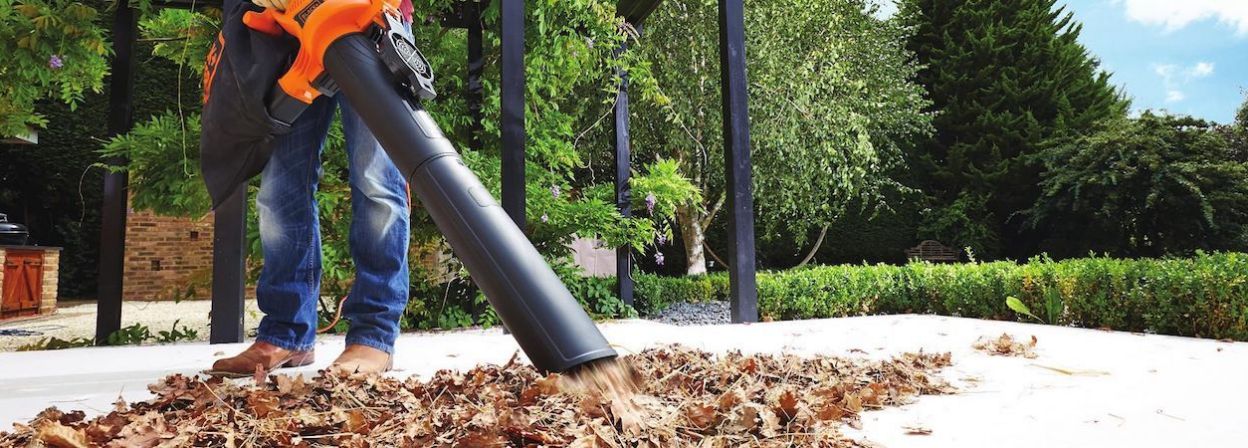BestReviews is reader-supported and may earn an affiliate commission. Details

A sturdy and powerful mulcher with an adjustable chute.
A sturdy and powerful mulcher with an adjustable chute.
Smaller size for easier storage. Runs at 7 HP with a 4-stroke single-cylinder engine fueled by 87+ gasoline. Mulches branches up to 3 inches thick. Can be towed behind a vehicle. Features rugged wheels and stand.
May not be able to mulch certain types of wood.

Compact and easy to operate multifunctional machine.
Compact and easy to operate multifunctional machine.
Blows up to 230 MPH and uses 12 amps of power. Features Anti-Clog Vortex for mulching and vacuuming modes. Weighs about 8 pounds. Simple to switch attachments and offers two speeds. Noise is 69 dB.
May not be as durable as other options.

An efficient electric mulcher with a stand-up construction.
An efficient electric mulcher with a stand-up construction.
This 13-amp mulcher handles 53 gallons of leaves in a minute. Easy to use and leaves drop into a bag below the unit. Weighs 20 pounds. Simple set-up without tools. Turns 11 bags of leaves into 1 when mulched.
Trim lines may need to be replaced often.

A 7 HP heavy-duty chipper designed to be strong but portable.
A 7 HP heavy-duty chipper designed to be strong but portable.
Gasoline mulcher with a 4-stroke single-cylinder motor and 10.7 feet pounds of torque. Can mulch branches up to 3 inches thick. Adjustable chute changes angle between 90 and 145 degrees. Uses 87+ gasoline and weighs 76 pounds.
May not always handle 3-inch branches.

An environment-friendly mulcher with enough power for small branches.
An environment-friendly mulcher with enough power for small branches.
This 15-amp electric chipper can handle branches that are 1.75 inches thick. Features 2 wheels and a sturdy stand. Chute on top covers steel blades. Bin holds 10.5 gallons of mulch. Includes a tool for loading debris safely.
Sticks and leaves have to be pushed into slots which can take extra time.

We recommend these products based on an intensive research process that's designed to cut through the noise and find the top products in this space. Guided by experts, we spend hours looking into the factors that matter, to bring you these selections.

A quality mulcher is one of the most important tools in your shed. A mulcher takes care of all your yard waste, from trimmings and prunings in the spring to fallen leaves and twigs in the fall. With a mulcher, you can turn all that unwanted rubbish into mulch to fertilize your yard.
But with so many options on the market – chippers, chipper shredders, mulchers, and blowers – how do you know which type of mulcher is best for your yard? Shopping for one of these handy machines can get confusing fast.
At BestReviews, we’ve got you covered. First, we’ll walk you through the big picture, and then we’ll help you narrow down your options so you can find the product that best fits your needs. Just keep reading.

A mulcher is a machine that turns yard waste, like leaves, twigs, and branches, into mulch. Spreading mulch on top of soil conserves moisture and improves the soil’s fertility. Mulch can also prohibit or reduce the growth of weeds. Plus, it’s an aesthetically pleasing addition to any yard.
Let’s take an in-depth look at the different types of mulchers.
Mulching lawn mowers
Whether it’s a push lawn mower or a riding lawn mower, the addition of a mulching blade will turn your mower into a mulcher. Mulching blades have a different shape than regular mowing blades. As the mulching blade spins, it creates a swirling airstream that keeps the grass aloft so it can be cut several times before settling back down to act as fertilizer. If you’re not fond of bagging leaves in the fall, you can simply mow over them with a mulching lawn mower, and the problem is solved. A lawn mower is only useful for mulching grass and leaves, however.
Mulching leaf blowers
A mulching leaf blower can be reversed and has an attachment for vacuuming and mulching. This type of mulcher can be a yard-saver if you have a property with a lot of obstacles. With a mulching leaf blower, you can get into hard-to-reach places where other tools can’t fit. You can easily clean that narrow space between your air conditioning unit and your house, clear out under your oil tank in just a few seconds, or blast away debris from the bottom of a chain-link fence. Like a lawn mower, a leaf blower is only good for grass and leaves.
Wood chippers
A wood chipper takes large pieces of wood, like tree branches, and turns them into wood chips. A wood chipper has one large hopper where you feed in the wood and a long narrow chute where the chips come out. These chips can be used as mulch in certain situations.
However, fresh wood chips temporarily deplete nitrogen and will suppress seed germination, so they should not be used in vegetable gardens or flower beds. Also, if spread improperly – pressed up around the base of a tree like a volcano – fresh wood chips can cause insect and fungal disease problems. Unless you live on a property with numerous trees, a wood chipper is usually not your best option.
Chipper shredders
A chipper shredder looks a lot like a wood chipper, but there are key differences. A chipper shredder is smaller because it is designed for home use. Also, a chipper shredder has two hoppers: a larger one for branches and a smaller one for twigs, leaves, and other organic debris. With a chipper shredder, you can clean up your entire yard using just one machine. It’s a powerful mulcher that is versatile enough for almost any yard waste.
A chipper shredder vacuum is a portable chipper shredder. This machine works like a lawn mower, but it also has a small chipper intake for branches and a vacuum for clearing leaves out of tight places.

If you opt to go with an electric mulcher, your work area will be limited to the length of your extension cord. With an electric mulcher, it’s important to know the proper gauge of extension cord that the mulcher requires.
Pros
Electric mulchers are quieter than gas mulchers. If noise level is a concern, this could be a deciding factor.
An electric machine is easier to maintain than a gas-powered one. If you are not handy with oil and machine maintenance, electric might be the way to go.
Electric mulchers are better for the environment. If a smaller carbon footprint is important to you, choose an electric mulcher.
When you operate an electric mulcher, you won’t be breathing in oil and gas fumes.
Electric mulchers are less expensive than gas mulchers.
Some mulching lawn mowers and mulching leaf blowers are battery-powered, which makes them completely mobile like gas mulchers.
Cons
With most electric mulchers, you are limited by the length of your extension cord. If you can’t get power to where you need it, you won’t be able to mulch.
Electric mulchers are not as powerful as gas mulchers, so they take longer to get the job done.
An electric chipper shredder may not be able to handle the diameter of the wood you need shredded.
A gasoline-powered chipper shredder is the best option when you need extra power to break down larger branches.
Pros
You can tap into more power with a gas mulcher. If you have a yard with a lot of branches and debris, especially if it’s larger in size, a gas mulcher is ideal.
Gas mulchers are not limited by an extension cord. Wherever you need to work, you can mulch.
Cons
A gas-powered mulcher is loud. You’ll need hearing protection, and you will need to be considerate of your neighbors.
Gas-powered equipment is not environmentally friendly. If you are primarily concerned with being green, electric is a better choice.
Using gas-powered equipment means you will be breathing in unhealthy fumes. You can help combat this with a proper mask.
A gas mulcher has more moving parts, making it more time-consuming and expensive to maintain.
Engine
A mulcher’s engine is rated in a number of ways. Horsepower is the amount of power a mulcher has, while the cc rating is how many cubic centimeters the pistons displace. Torque is the amount of turning power a mulcher has. The higher the number for all of these, the greater the power of the mulcher.
Hopper
The hopper size is the width of the opening where you feed debris into the mulcher. However, a larger hopper size does not necessarily mean you can put larger sticks and branches into the machine. The maximum feed diameter is the number that tells you the largest diameter you can feed into the hopper.
Reduction ratio
The reduction ratio measures the mulcher’s efficiency. For example, if a mulcher has a 15:1 ratio, it means the machine can reduce 15 bags of debris down to one bag.
Weight
It is important to know the weight of any mulcher you’re considering. If you need to transport your machine, it matters how heavy it is.
Extras
If your mulcher is on the heavier end, a tow bar or trailer hitch will allow you to more easily transport the machine. A tilt-down hopper lets you tilt the hopper so you can rake debris directly into the mulcher. Another handy feature is a collection bag, which can be placed over your mulcher’s discharge for the easy collection of mulch.

Q. What are the dangers of using an improper extension cord with my mulcher?
A. Any extension cord you use with your mulcher must be in good condition with no visible damage. It must be heavy enough to carry the electrical current the distance you need. If the extension cord is not of the proper gauge for the mulcher, you can have a drop in voltage that will result in overheating. To reduce the risk of shock, always use a properly grounded three-prong outlet protected with a 20A fuse, and never remove the ground prong from the plug.
Q. As long as it’s less than the recommended diameter, I can toss it in the chipper shredder, right?
A. No! First, your mulcher is only designed for dispensing with organic yard waste, nothing else should be put in the hopper. Second, fresh vines can get tangled inside the machine. Always consult your owner’s manual for specific cautions.
Q. What is a PTO shaft?
A. A PTO (power takeoff) shaft is actually another way you can power your mulcher. It transfers the power from a tractor to a rotary machine. However, this is usually not a viable power option for the typical homeowner.
Get emails you’ll love.
Learn about the products you’re wondering if you should buy and get advice on using your latest purchases.
